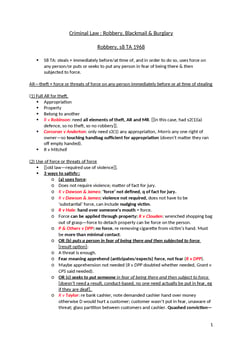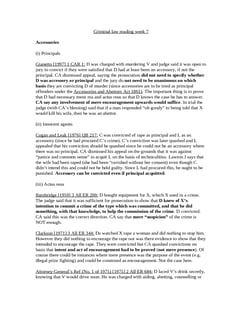R v Hinks [2001] 2 AC 241 (HL); [2000] 3 WLR 1590; [2000] 4 All ER 833; [2000] 10 WLUK 685
Judgement for the case R v Hinks
Table Of Contents
KEY POINTS
Crime, particularly theft, is a complex legal area governed by statutes like the Theft Act 1968 (c 60).
-
In unique cases, individuals with low intelligence giving large sums of money and gifts might face theft charges.
The central concern revolves around determining intent, specifically whether the donee, even when receiving a gift, had the intent to deprive the donor of their property permanently.
The concept of "appropriation" under the Theft Act 1968 is important, as it defines the unauthorized assumption of ownership.
Courts must navigate these nuances to establish criminal liability while considering the mental state of those involved. The legal position in theft cases involving gifts and diminished mental capacity requires a delicate balance of legal principles and ethical considerations.
FACTS
-
Karen Maria Hinks ("Defendant") befriended D, a man with limited intelligence holding savings and inheritance in a building society account.
Over seven months, Defendant accompanied D to make daily withdrawals totaling £60,000, deposited into Defendant's account.
The Defendant was charged with theft, including the transfer of D's TV.
A psychiatrist testified that D was naive and could not decide to part with money independently.
Despite the Defendant's appeal, the jury convicted based on the Court of Appeal's stance that the crucial question was appropriation under the Theft Act 1968, not the validity of a gift.
The court highlighted that a gift could be clear evidence of appropriation, reinforcing the conviction.
JUDGEMENT
-
On the Defendant's appeal, the court held, having dismissed the appeal with the dissenting opinions of Lord Hutton and Lord Hobhouse of Woodborough, that the term "appropriation" within the context of section 3(1) of the Theft Act 1968 was deemed a neutral word, encompassing any assumption by a person of the owner's rights.
The court emphasized that a more restrictive interpretation would unjustifiably limit the scope of theft law and complicate fair and effective prosecution.
The court ruled that the acquisition of an indefeasible title to property from an individual who no longer possessed any proprietary interest or the right to resume or recover such interest could still qualify as an "appropriation" of that property.
It was asserted that the required mental element for a theft conviction was an adequate safeguard against injustice.
In comprehensive and impartial summation and a compelling prosecution case, the court concluded that the jury had embraced the prosecution's argument while rejecting the Defendant's account.
The court deemed the convictions for theft to be entirely secure.
COMMENTARY
This case explores the various legal complexities of theft cases, particularly those involving persons with poor intellect.
-
It emphasizes the significance of ascertaining purpose and "appropriation" under the Theft Act 1968.
Karen Maria Hinks' case demonstrates these difficulties since the Defendant faces theft charges for accompanying D, a person with poor intellect, on regular withdrawals.
The court's decision rejected a narrow interpretation of appropriation and emphasized the broader scope of theft legislation.
Despite the Defendant's appeal, the court declares the convictions safe, emphasizing the jury's acceptance of the prosecution's case and rejection of the Defendant's claim.
This case demonstrates the balancing of legal rules and ethical issues in theft cases involving presents and impaired mental ability.
For Further Study on R v Hinks
Need instant answers? Our AI exam tutor is here to help.
Ask questions 🙋 Get answers 📔 It's simple 👁️👄👁️
Our AI is educated by the highest scoring students across all subjects and schools. Join hundreds of your peers today.
Get StartedRelated Product Samples
These product samples contain the same concepts we cover in this case.
| GDL Criminal Law | Theft Notes (7 pages) |
| Criminal Law | Theft Notes (21 pages) |
| GDL Criminal Law | Theft Related Offences Notes (11 pages) |


